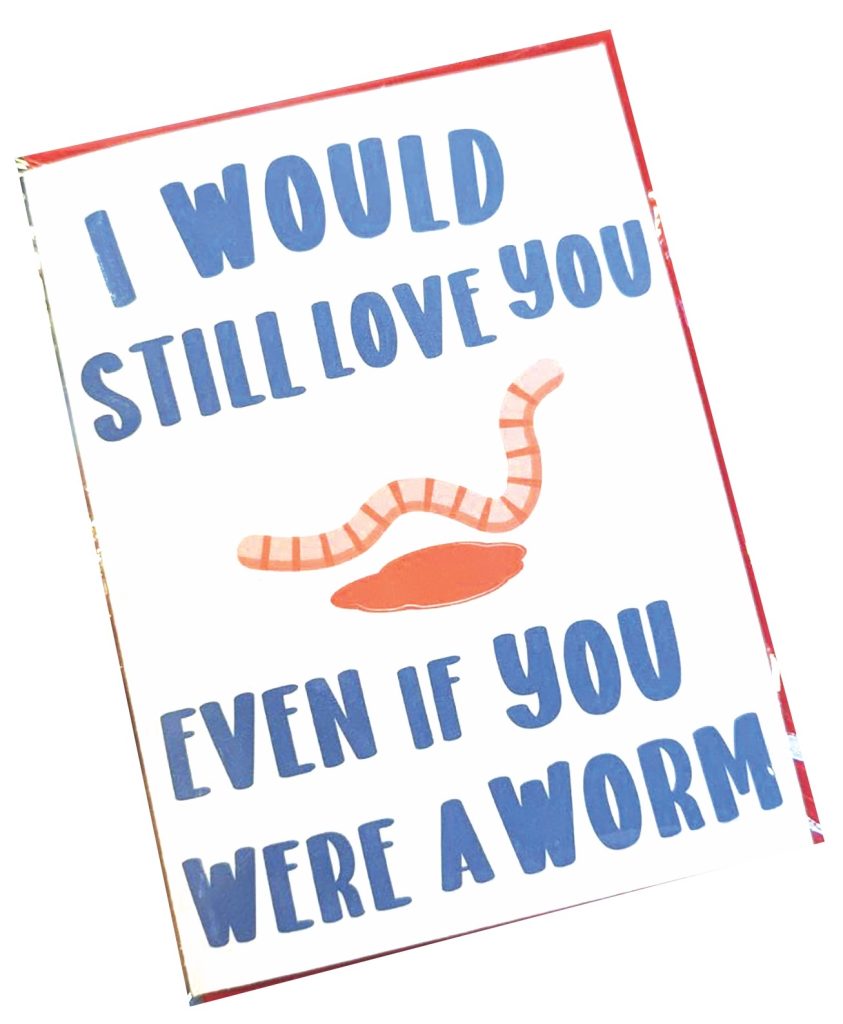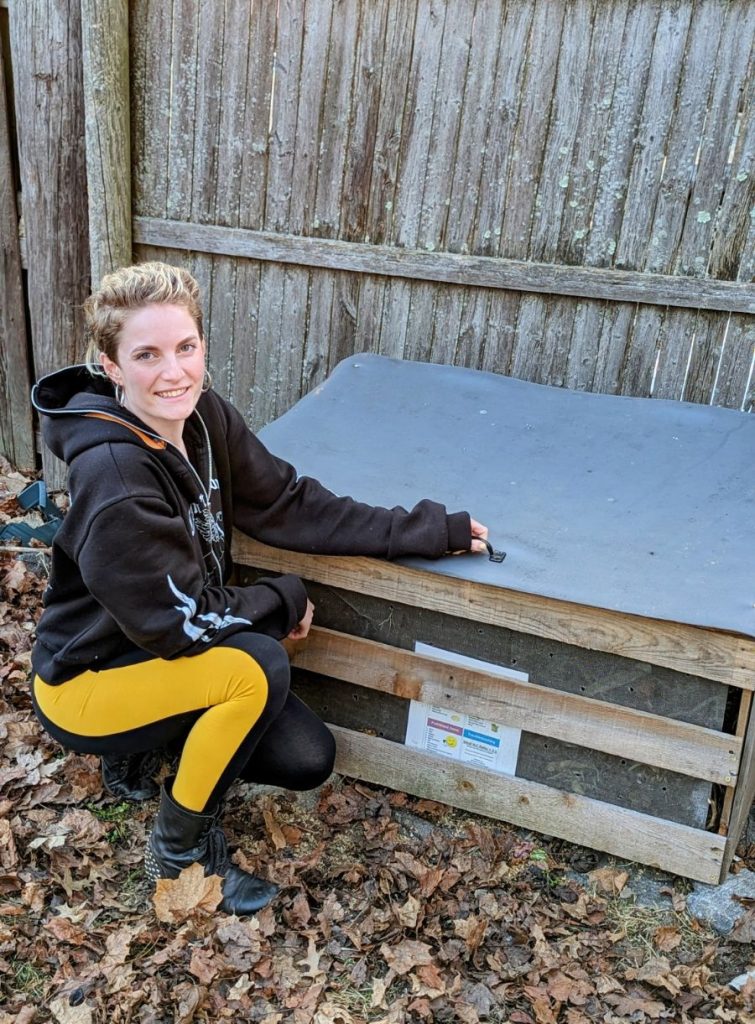
Would you still love me if I was a worm? A timeless question made to keep couples at odds. Understandably, worms at a surface level do not seem like the ideal muses, but that shouldn’t diminish their wiggly cuteness, general chillness, and importance in nature. I would still love you!
The day-to-day life of a worm isn’t glamorous, but they are an important part of the cycle of composting. At a micro-level, composting is nature’s way of recycling dead or old life forms to support the growth of new plants. And it isn’t just worms: There are all sorts of microbes, bacteria, fungi, and insects that break everything down. Every living thing becomes compost, eventually.
It’s a living, breathing cycle that is as old as life itself and is an important part of our transient and ever-changing natural world. Just think of all the dead leaves on your favorite hiking trail in the fall that are almost completely gone by spring. They’re not truly gone, they were broken down into the soil to support new growth.
Composting at home is a tried-and-true way for people to contribute to a greener food economy. Nitrogen-rich kitchen scraps such as squash guts, carrot ends, and apple peels, are mixed with carbon-rich dead leaves or wood chips at an approximate 1 to 3 ratio. After about three months of occasional turning for oxygen flow, the finished compost is teeming with nutrients, fungi, and bacteria, which can be used to boost the growth of fruits, vegetables, and flowers through soil-nutrient density and improved water retention.
Providence east-sider Anne Harris has a fascination with fungi, visual art, and home composting. She moved to Providence in spring 2023; it was the first time she had access to a yard with raised garden beds. Growing up with a garden, her mom instilled in her that composting makes better soil, which in turn produces better food.

“I looked online and found a lot of home composting units for sale; however, they were over $100 and usually made from plastic,” Harris says. “I decided to try and design my own with some ‘reclaimed’ materials as a fun home project.” She settled on a design made from a simple box built on a foundation of yard rocks with slats to allow airflow and a heavy lid to prevent backyard creatures from getting in.
Harris sourced materials like a wooden palette for a frame and a waterproof floor mat to make sure the compost moisture levels were contained. “I had to purchase wood screws and a handle for the lid, but it came out to around $10. There are likely materials around you that you can use, or find at home, or at garage sales, or thrift stores. There are all kinds of low-cost options if you want to take on a project.”
Harris shares the unit with her housemates and composts primarily vegetable and fruit scraps, as well as spent grain from a housemate that homebrews beer. No meat or dairy is added because it would attract pests and be more likely to smell. Some home composting setups are as simple as a hole in the ground, you just need to be mindful about location and containment.
“Don’t be afraid to start composting, it’s simpler than you think once you get a feel for the ratios. It’s satisfying to connect with the circular food chain, and it adds another level of excitement to cooking and gardening. There’s nothing like a homegrown tomato!”
Like Harris, Michael Bradlee, a long-time Providence resident, learned composting at a young age while in his grandparents’ garden. He helped by collecting coffee grounds, banana peels, and eggshells and then buried them in the ground. His young mind was puzzled when piles of food scraps mixed with the leaves were taken into nature’s clutches and miraculously transformed into “black gold” over the winter.
In young adulthood, he followed the teachings of his grandparents and pursued work in garden design and landscaping. He worked with a variety of clients who would often request he set a space for composting kitchen scraps. During this time, he experimented with various designs for urban composting and found success in a few he eventually patented.
These designs led him to form his pay-what-you-can nonprofit hub for composting in PVD, the Community Compost Depot. At the Depot, neighbors can drop off their compostable materials to Bradlee’s off-Smith Street site, the compostable materials are then slowly churned in Bradlee’s patented composting vessels. Adjacent to the site are community gardens; subscribed community members may then use the finished compost in their gardens.
“Composting should be affordable and equitable,” says Bradlee “Anyone can join, everyone gets the same service, and it runs completely on donations. I believe education is the key and I’m planning on opening a training site for community workshops for different gardening and composting techniques.”
The vessels are well-contained and designed for urban settings like Providence, where odors and pests are not an issue during the three-month process. He dreams of scaling the nonprofit to other cities, parks, and densely populated neighborhoods, but his bandwidth as a full-time chemist, and funding, are consistent hurdles to expansion.
“Nothing feels like removing what is considered waste and converting it into a resource.” Bradlee does this because he sees it as a great way to engage with his community. “I’m an introvert, and meeting people in this positive setting is my favorite way to make quality connections. Hope to see you soon, Providence!”
Come to think of it, composting on a macro level can be pretty involved. Humans waste a lot of stuff. Not everyone has the time, resources, or knowledge to start their own compost site or contribute to a community group. Especially if you’re running a restaurant or business, which is exactly why commercial compost haulers like Bootstrap Compost have provided composting services to residential and commercial doorsteps in the Boston and PVD metro areas for over 10 years.
Somerville native Lena Johnson is the bright and dedicated Bootstrap director of commercial sales, but in a previous era, she worked at a café in Cambridge that was committed to minimizing food waste. Johnson was tasked with implementing compost for front-of-house and back-of-house service, by removing the trash entirely from the waste stream.
“The café had bus bins that customers would place their plates in, and employees would separate the uneaten waste from the recyclable materials and the actual trash like plastic.” Johnson saw early on how much waste this process produced daily, weekly, and monthly. “It was a good exercise for dividing the labor between the customer and the employee.”
During the pandemic, Johnson left the café, but its lessons resonated with her. When the opportunity arose to join Bootstrap Compost and expand their commercial toter service, it felt like a no-brainer. “When I started, it was restaurant and connection focused. But when margins kept getting slimmer, not everyone had the money to pay for compost pick up service. However, biotech and forward-thinking offices are increasingly interested in turn-key premium service, and we’ve carved out a great niche to greenify these offices.
“It’s important for businesses to understand that implementing composting can offset trash cost since most of the trash from a food business is food scraps. Plus, there’s an amazing positive impact on marketing since we track the total amount of waste over time. More customers want to see this, and it can boost morale for employees.” The company currently services all kinds of commercial clients such as Converse, GE Aerospace, and select offices in the Massachusetts State House.
Team Boot also works with different event organizers across New England to create zero food waste events, such as RI VegFest, weddings, GFree Fest (RI’s Gluten Free Festival), and more. Team Boot is able to divert thousands of pounds of waste per event. Flexibility, variability, and high-level service are the keys to creating zero food waste events through composting.
“My goal in this role is to partner with more like-minded businesses that are committed to diverting food waste and creating a brighter future,” says Johnson. “I want to create more community engagement through the schools and event spaces we partner with, and would love to see a Dunkin or not-obvious partner work with us for more sustainable food waste solutions.”
As the composting movement grows, municipal composting services are starting to catch on. Working with commercial compost haulers on these initiatives may be the key to making municipal composting more commonplace in urban centers such as PVD.
We all have our place on the sliding scale of sustainability but share the shoulder of responsibility to be mindful of what we take and give back to the earth. Organic materials in the landfill stay garbage forever, while the alternative is decomposing back to make stronger plants and more resilient soil.
Composting at home can be a fun project to do with the kids and can help your business do better in the capitalist world. It can serve as a lasting lesson for how we can change our behavior to leave the world better than we found it. If not for ourselves, then for the seeds that have yet to grow.